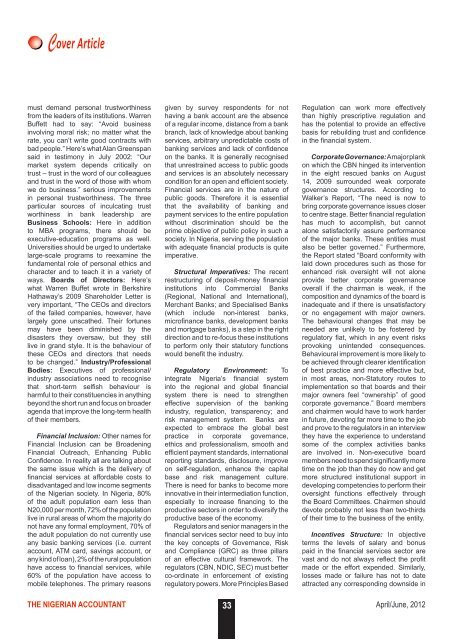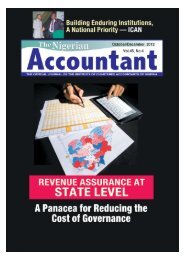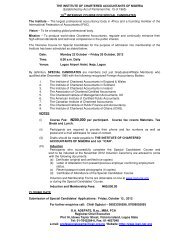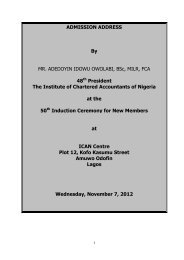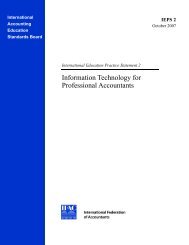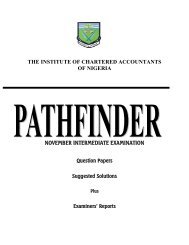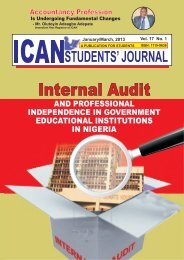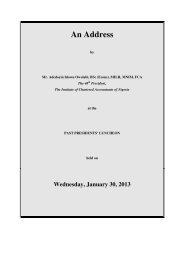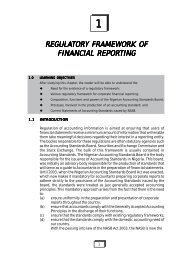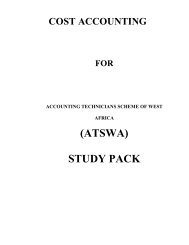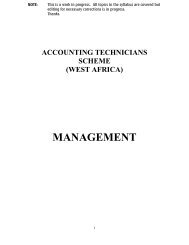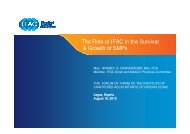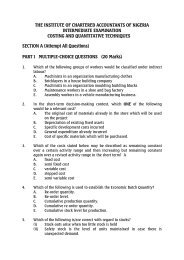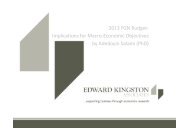The Nigerian Accountant 2012 - The Institute of Chartered ...
The Nigerian Accountant 2012 - The Institute of Chartered ...
The Nigerian Accountant 2012 - The Institute of Chartered ...
You also want an ePaper? Increase the reach of your titles
YUMPU automatically turns print PDFs into web optimized ePapers that Google loves.
Cover Article<br />
must demand personal trustworthiness<br />
from the leaders <strong>of</strong> its institutions. Warren<br />
Buffett had to say: “Avoid business<br />
involving moral risk; no matter what the<br />
rate, you can’t write good contracts with<br />
bad people.” Here’s what Alan Greenspan<br />
said in testimony in July 2002: “Our<br />
market system depends critically on<br />
trust – trust in the word <strong>of</strong> our colleagues<br />
and trust in the word <strong>of</strong> those with whom<br />
we do business.” serious improvements<br />
in personal trustworthiness. <strong>The</strong> three<br />
particular sources <strong>of</strong> inculcating trust<br />
worthiness in bank leadership are<br />
Business Schools: Here in addition<br />
to MBA programs, there should be<br />
executive-education programs as well.<br />
Universities should be urged to undertake<br />
large-scale programs to reexamine the<br />
fundamental role <strong>of</strong> personal ethics and<br />
character and to teach it in a variety <strong>of</strong><br />
ways. Boards <strong>of</strong> Directors: Here’s<br />
what Warren Buffet wrote in Berkshire<br />
Hathaway’s 2009 Shareholder Letter is<br />
very important, “<strong>The</strong> CEOs and directors<br />
<strong>of</strong> the failed companies, however, have<br />
largely gone unscathed. <strong>The</strong>ir fortunes<br />
may have been diminished by the<br />
disasters they oversaw, but they still<br />
live in grand style. It is the behaviour <strong>of</strong><br />
these CEOs and directors that needs<br />
to be changed.” Industry/Pr<strong>of</strong>essional<br />
Bodies: Executives <strong>of</strong> pr<strong>of</strong>essional/<br />
industry associations need to recognise<br />
that short-term selfish behaviour is<br />
harmful to their constituencies in anything<br />
beyond the short run and focus on broader<br />
agenda that improve the long-term health<br />
<strong>of</strong> their members.<br />
Financial Inclusion: Other names for<br />
Financial Inclusion can be Broadening<br />
Financial Outreach, Enhancing Public<br />
Confidence. In reality all are talking about<br />
the same issue which is the delivery <strong>of</strong><br />
financial services at affordable costs to<br />
disadvantaged and low income segments<br />
<strong>of</strong> the <strong>Nigerian</strong> society. In Nigeria, 80%<br />
<strong>of</strong> the adult population earn less than<br />
N20,000 per month, 72% <strong>of</strong> the population<br />
live in rural areas <strong>of</strong> whom the majority do<br />
not have any formal employment, 70% <strong>of</strong><br />
the adult population do not currently use<br />
any basic banking services (i.e. current<br />
account, ATM card, savings account, or<br />
any kind <strong>of</strong> loan), 2% <strong>of</strong> the rural population<br />
have access to financial services, while<br />
60% <strong>of</strong> the population have access to<br />
mobile telephones. <strong>The</strong> primary reasons<br />
given by survey respondents for not<br />
having a bank account are the absence<br />
<strong>of</strong> a regular income, distance from a bank<br />
branch, lack <strong>of</strong> knowledge about banking<br />
services, arbitrary unpredictable costs <strong>of</strong><br />
banking services and lack <strong>of</strong> confidence<br />
on the banks. It is generally recognised<br />
that unrestrained access to public goods<br />
and services is an absolutely necessary<br />
condition for an open and efficient society.<br />
Financial services are in the nature <strong>of</strong><br />
public goods. <strong>The</strong>refore it is essential<br />
that the availability <strong>of</strong> banking and<br />
payment services to the entire population<br />
without discrimination should be the<br />
prime objective <strong>of</strong> public policy in such a<br />
society. In Nigeria, serving the population<br />
with adequate financial products is quite<br />
imperative.<br />
Structural Imperatives: <strong>The</strong> recent<br />
restructuring <strong>of</strong> deposit-money financial<br />
institutions into Commercial Banks<br />
(Regional, National and International),<br />
Merchant Banks; and Specialised Banks<br />
(which include non-interest banks,<br />
micr<strong>of</strong>inance banks, development banks<br />
and mortgage banks), is a step in the right<br />
direction and to re-focus these institutions<br />
to perform only their statutory functions<br />
would benefit the industry.<br />
Regulatory Environment: To<br />
integrate Nigeria’s financial system<br />
into the regional and global financial<br />
system there is need to strengthen<br />
effective supervision <strong>of</strong> the banking<br />
industry, regulation, transparency; and<br />
risk management system. Banks are<br />
expected to embrace the global best<br />
practice in corporate governance,<br />
ethics and pr<strong>of</strong>essionalism, smooth and<br />
efficient payment standards, international<br />
reporting standards, disclosure, improve<br />
on self-regulation, enhance the capital<br />
base and risk management culture.<br />
<strong>The</strong>re is need for banks to become more<br />
innovative in their intermediation function,<br />
especially to increase financing to the<br />
productive sectors in order to diversify the<br />
productive base <strong>of</strong> the economy.<br />
Regulators and senior managers in the<br />
financial services sector need to buy into<br />
the key concepts <strong>of</strong> Governance, Risk<br />
and Compliance (GRC) as three pillars<br />
<strong>of</strong> an effective cultural framework. <strong>The</strong><br />
regulators (CBN, NDIC, SEC) must better<br />
co-ordinate in enforcement <strong>of</strong> existing<br />
regulatory powers. More Principles Based<br />
Regulation can work more effectively<br />
than highly prescriptive regulation and<br />
has the potential to provide an effective<br />
basis for rebuilding trust and confidence<br />
in the financial system.<br />
Corporate Governance: A major plank<br />
on which the CBN hinged its intervention<br />
in the eight rescued banks on August<br />
14, 2009 surrounded weak corporate<br />
governance structures. According to<br />
Walker’s Report, “<strong>The</strong> need is now to<br />
bring corporate governance issues closer<br />
to centre stage. Better financial regulation<br />
has much to accomplish, but cannot<br />
alone satisfactorily assure performance<br />
<strong>of</strong> the major banks. <strong>The</strong>se entities must<br />
also be better governed.” Furthermore,<br />
the Report stated “Board conformity with<br />
laid down procedures such as those for<br />
enhanced risk oversight will not alone<br />
provide better corporate governance<br />
overall if the chairman is weak, if the<br />
composition and dynamics <strong>of</strong> the board is<br />
inadequate and if there is unsatisfactory<br />
or no engagement with major owners.<br />
<strong>The</strong> behavioural changes that may be<br />
needed are unlikely to be fostered by<br />
regulatory fiat, which in any event risks<br />
provoking unintended consequences.<br />
Behavioural improvement is more likely to<br />
be achieved through clearer identification<br />
<strong>of</strong> best practice and more effective but,<br />
in most areas, non-Statutory routes to<br />
implementation so that boards and their<br />
major owners feel “ownership” <strong>of</strong> good<br />
corporate governance.” Board members<br />
and chairmen would have to work harder<br />
in future, devoting far more time to the job<br />
and prove to the regulators in an interview<br />
they have the experience to understand<br />
some <strong>of</strong> the complex activities banks<br />
are involved in. Non-executive board<br />
members need to spend significantly more<br />
time on the job than they do now and get<br />
more structured institutional support in<br />
developing competencies to perform their<br />
oversight functions effectively through<br />
the Board Committees. Chairmen should<br />
devote probably not less than two-thirds<br />
<strong>of</strong> their time to the business <strong>of</strong> the entity.<br />
Incentives Structure: In objective<br />
terms the levels <strong>of</strong> salary and bonus<br />
paid in the financial services sector are<br />
vast and do not always reflect the pr<strong>of</strong>it<br />
made or the effort expended. Similarly,<br />
losses made or failure has not to date<br />
attracted any corresponding downside in<br />
THE NIGERIAN ACCOUNTANT 33<br />
April/June, <strong>2012</strong>


